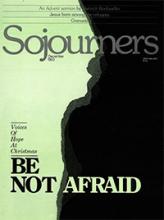December 11
Third Sunday in Advent
Psalm 146; Isaiah 35:1-10; James 5:1-7; Matthew 11:2-11.
Advent is not just about the birth of a baby, even this special baby. It is about the coming of God, the "good news" of God's incursion into a world that seems closed and well-defined against any such incursion.
These texts focus rightly on discipleship and what to do. But Advent is also a time to draw back a little from doing to ask about what to hope. We may wonder who is coming, and if we would recognize the coming one upon arrival.
The modern American church, an enmeshed church, is infested with idols, that is, false articulations of God. Conservatives tend to think the God question is settled in some sure formula; liberals tend to think it is not terribly important, and so it may be safely entrusted to conservatives.
But our texts insist that faithful people must continually consider who God is. This lively discussion is necessary because our dim discernment of God is mixed with trappings, conventions, vested interests, lesser loyalties. Can we spot the real God amidst the idols at the time of the coming?
The two Old Testament texts articulate a God who is wholly other, that is, not a function of our other commitments. The power agents of this age, the "princes" of Psalm 146:3, are no help. Alliances of that sort will not work. They are of no help, but the real God helps (verse 5).
Real help is precisely for the helpless. This help takes the form of justice, food, freedom, and sight (verses 7-8). The agenda of the real God is sojourners who do not belong, widows without adequate pension, orphans who have no voice, access, or representation. God is celebrated as the help of the helpless.
Read the Full Article

